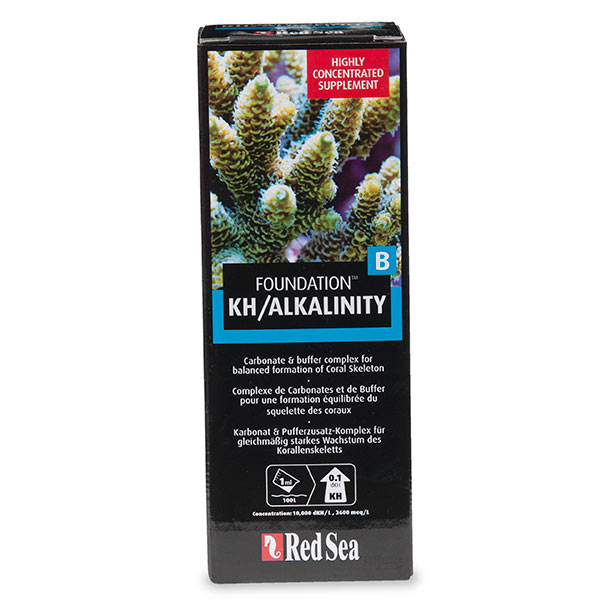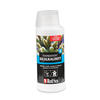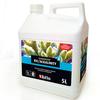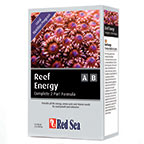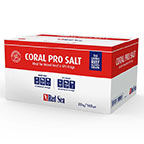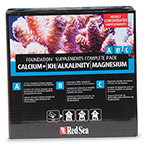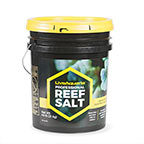Overview
| * | Carbonate and buffer complex for successful coral reef aquariums |
| * | Creates optimal aquarium conditions for strong, healthy coral growth |
| * | Use with Reef Foundation A & C for balanced coral skeleton formation |
Maintain ideal reef aquarium parameters necessary for promoting strong and healthy coral growth. Red Sea Reef Foundation B Reef Supplement is a complex of carbonate and other buffers present in seawater that maintain proper alkalinity and aquarium pH.
Red Sea Reef Foundation B Reef Supplement is part of Red Sea's Reef Foundation Reef Care Program designed to define and maintain correctly balanced levels of calcium, alkalinity, and magnesium for successful coral reef aquariums. Foundation Elements include the three major elements: calcium (Ca), magnesium (Mg) and bicarbonates (HCO3). These three elements have a major effect on reef-aquarium water chemistry (pH stability, alkalinity, and seawater ionic strength) as well as many biological processes of corals (skeleton formation, ion exchange and photosynthesis).
Use Red Sea Reef Foundation B Reef Supplement in conjunction with Red Sea Reef Foundation A Reef Supplement and Red Sea Reef Foundation C Reef Supplement to supply calcium and magnesium in correct ratios necessary for balanced coral skeleton formation.
Concentration:
Liquid supplement: 1ml will raise the alkalinity of 100 liters (25gal) by 0.036 meq/l (0.1dKH).
Use the Red Sea Alkalinity Pro Test Kit before, during and after supplementation to measure and maintain ideal alkalinity levels specific to your particular reef aquarium setup.
General Instructions for Testing and Supplementing
- Before carrying out any water testing, always check the salinity and make adjustments as necessary. If you have made adjustments to the water, wait 10 minutes for the water parameters to stabilize. (e.g. 1 ppt increase in salinity due to evaporation of fresh water will result in approximate increases of 13ppm Ca and 40ppm Mg)
- Test only with high accuracy test kits such as Red Sea's Foundation program (Calcium, Alkalinity & Magnesium) Pro Titration Kits.
- All of the Red Sea Reef Care Program supplements have dosing charts (on back of product) based on treating 100 liters / 25 gallons of water. Estimate your total volume of water (aquarium & sump less volume of live rocks etc) to calculate the correct dosage for your system.
- Supplements should be added to the sump. If you do not have a sump, add the supplements slowly to an area with high water flow to prevent direct contact with fish and corals.
- To prevent stress to the corals, the maximum daily increases of each of the elements are as follows: Calcium 20ppm; Alkalinity 0.5 meq/l (1.4 dkh); Magnesium 10ppm. Larger adjustments should be spread over a few days according to the daily maximum.
- In order to prevent the effects of unbalanced levels of the foundation elements, the supplements should be added in the following order allowing 10 minutes between each:
- Magnesium
- Alkalinity
- Calcium
Initial Adjustment of Foundation Elements to Optimal Levels
When first using the Reef Foundation products or after a water-change, test the levels of the Foundation Elements and supplement as necessary to achieve the optimal levels.
Weekly Dosing - Soft / LPS Corals
Test the Foundation Elements every week and dose each supplement to replenish back to the optimal levels.
Daily Dosing - SPS / LPS Corals
Ensure that all of the Foundation Elements are at optimal values and run the aquarium for 4 days at a stable salinity (compensate for evaporation daily by adding fresh water) without adding any supplements. At the end of the 4 days, test the Foundation Elements and calculate the "4 day dosage" of each supplement to replenish back to the optimal levels. Add the "4 day dosage" to the system. Divide this "4 day dosage" by 4 and use as the daily dosage for the next week.
After a week of adding the daily dosage, test the Foundation Elements and calculate the "adjusting dosage" of each supplement to replenish back to the optimal levels.
- If the adjusting dosage is significantly different from the previous daily dosage, amend (increase/decrease) the daily dosage as appropriate.
- If the measured level of a specific element is above the optimal level, wait for the excess of the element to be depleted before restarting the daily supplementation with the amended daily dosage.
Continue testing all of the elements every week and make adjustments to the daily dosages as required. As your corals grow or you add or remove livestock, the uptake of the elements in your aquarium will gradually change. It is recommended to keep a log book of the weekly measurements and dosages. If you miss one or more days of supplementing, add the complete amount that you have missed but do not exceed the maximum recommended daily increase for any of the elements.
General Instructions for Testing and Supplementing- Before carrying out any water testing, always check the salinity and make adjustments as necessary. If you have made adjustments to the water, wait 10 minutes for the water parameters to stabilize. (e.g. 1 ppt increase in salinity due to evaporation of fresh water will result in approximate increases of 13ppm Ca and 40ppm Mg)
- Test only with high accuracy test kits such as Red Sea's Foundation program (Calcium, Alkalinity & Magnesium) Pro Titration Kits.
- All of the Red Sea Reef Care Program supplements have dosing charts (on back of product) based on treating 100 liters / 25 gallons of water. Estimate your total volume of water (aquarium & sump less volume of live rocks etc) to calculate the correct dosage for your system.
- Supplements should be added to the sump. If you do not have a sump, add the supplements slowly to an area with high water flow to prevent direct contact with fish and corals.
- To prevent stress to the corals, the maximum daily increases of each of the elements are as follows: Calcium 20ppm; Alkalinity 0.5 meq/l (1.4 dkh); Magnesium 10ppm. Larger adjustments should be spread over a few days according to the daily maximum.
- In order to prevent the effects of unbalanced levels of the foundation elements, the supplements should be added in the following order allowing 10 minutes between each:
- Magnesium
- Alkalinity
- Calcium
Initial Adjustment of Foundation Elements to Optimal Levels
When first using the Reef Foundation products or after a water-change, test the levels of the Foundation Elements and supplement as necessary to achieve the optimal levels.
Weekly Dosing - Soft / LPS Corals
Test the Foundation Elements every week and dose each supplement to replenish back to the optimal levels.
Daily Dosing - SPS / LPS Corals
Ensure that all of the Foundation Elements are at optimal values and run the aquarium for 4 days at a stable salinity (compensate for evaporation daily by adding fresh water) without adding any supplements. At the end of the 4 days, test the Foundation Elements and calculate the "4 day dosage" of each supplement to replenish back to the optimal levels. Add the "4 day dosage" to the system. Divide this "4 day dosage" by 4 and use as the daily dosage for the next week.
After a week of adding the daily dosage, test the Foundation Elements and calculate the "adjusting dosage" of each supplement to replenish back to the optimal levels.
- If the adjusting dosage is significantly different from the previous daily dosage, amend (increase/decrease) the daily dosage as appropriate.
- If the measured level of a specific element is above the optimal level, wait for the excess of the element to be depleted before restarting the daily supplementation with the amended daily dosage.
Continue testing all of the elements every week and make adjustments to the daily dosages as required. As your corals grow or you add or remove livestock, the uptake of the elements in your aquarium will gradually change. It is recommended to keep a log book of the weekly measurements and dosages. If you miss one or more days of supplementing, add the complete amount that you have missed but do not exceed the maximum recommended daily increase for any of the elements.
General Information
The Foundation Elements (Ca, KH & Mg)
Skeletogenesis
Skeletogenesis is the process by which special cells within the corals soft tissue, combine the Foundation Elements together with Strontium and Barium from the surrounding water to form the building blocks of coral skeletons.
Corals build approximately 90% of their skeleton by combining Ca and CO3 ions from the water to form Aragonite (CaCO3). The rest of the skeleton is made up from Magnesite (MgCO3), Strontianite (SrCO3), Calcite (a more brittle crystal structure of CaCO3), Fluorite (CaF2) and other minor and trace minerals.
In unbalanced conditions, such as low levels of Mg and/or Sr, the skeleton will develop with a higher proportion of Calcite making it more brittle and more susceptible to damage. The Foundation Elements complement each other in the formation of coral skeleton and if not available in the correct ratios, one of them will quickly become the limiting factor of healthy coral growth.
Coral Growth
Corals need to invest energy in transporting the foundation and other elements necessary for skeletogenesis from the surrounding water through their soft tissue. Elevated levels of the Foundation Elements create a more positive ionic pressure enabling passive diffusion of the elements through the soft tissue making this process much more efficient (less energy required per gram of skeleton). Therefore, balanced, elevated levels of the Foundation Elements will result in accelerated coral growth rates.
In mature systems where accelerated growth is not desired or when aiming to enhance coral coloration by reducing the levels of algae nutrients, lower, balanced levels of the Foundation Elements should be maintained.
Optimal Levels of the Foundation Elements
Unlike the natural reef environment, where there is an immense reservoir of the Foundation Elements, the reef aquarium is an artificial environment that is constantly affected by chemical changes and therefore, the Foundation Elements must be monitored and replenished constantly. Furthermore, research has shown that the optimal levels of these elements should be maintained according to the variety and maturity of the specific coral population.
Choose the optimal levels according to the most demanding species in your aquarium.
| Optimal levels of salinity, alkalinity, calcium and magnesium according to type of aquarium | |||||
| Aquarium Type | Supplement Frequency | Salinity (ppt) | Alkalinity (dKH meq/l) | Ca (mg/l) | Mg (mg/l) |
| Fish | Weekly | 31 | 7.0/2.5 | 385 | 1220 |
| Soft Corals | Weekly | 33 | 8.2/2.9 | 430 | 1280 |
| LPS Corals | Daily/Weekly | 33 | 12.1/4.3 | 440 | 1310 |
| SPS Corals, Frags/ Calms Accelerated Growth | Daily | 35 | 12.6/4.5 | 465 | 1390 |
| SPS Corals: Mature/ Low Nutrient System | Daily | 35 | 8.2/2.9 | 430 | 1310 |
Note: The alkalinity is a measure of the concentration of all buffering substances such as bicarbonate (HCO3), carbonate (CO3), hydroxide (OH) and borate (BO3). Alkalinity is measured in mille equivalents per liter meq/L or in degrees of Carbonate Hardness (dKH = meq/L x 2.8). Avoid using test kits that measure carbonates as this does not measure total alkalinity.
Testing and Supplementing
- SPS corals have a relatively high uptake of calcium and carbonates. However, since the stability of the water parameters is essential for their health and vitality, supplementing of the Foundation Elements should be performed daily.
- LPS corals have a lower uptake of calcium and carbonates and therefore, they can tolerate the Foundation Elements being supplemented weekly. They will however benefit from a daily supplementing regime. Choose which of these supplementing options is best for you and your aquarium.
- Soft corals should be supplemented weekly.
Causes and Effects of Unbalanced Levels of Foundation Elements
- New aragonite substrate - new aragonite surfaces can increase the non-biological precipitation of calcium and carbonates, which will lead to their depletion from the water, causing a drop in calcium and alkalinity.
- Unbalanced salt mixture - low magnesium or high calcium can lead to alkalinity drops.
- Excessive dosing of calcium or buffer (without dosing magnesium) - Adding too much calcium (to saturation levels) can lead to a sudden drop in alkalinity. Adding too much buffer to an aquarium with calcium at saturation levels will cause precipitation, leading to low calcium levels.
The phenomena listed above are typical to many chemically unbalanced marine and reef tanks causing stress to the inhabitants as well as to the aquarist. Balanced supplementation should therefore be implemented to maintain calcium, magnesium and alkalinity at the recommended levels.
The Reef Foundation Supplements- Reef Foundation A contains Calcium, Strontium & Barium in the ratios as found in coral skeleton.
- Reef Foundation C contains Magnesium.
Magnesium Pro Test Kit is an advanced titration test, measuring the level of Magnesium to an accuracy of 20 ppm.
KH Alkalinity Pro Test Kit is an advanced titration test, measuring the level of buffers to an accuracy of 0.05 meq/L (0.14dKH).
Calcium Pro Test Kit is an advanced titration test, measuring the level of calcium to an accuracy of 5 ppm.


